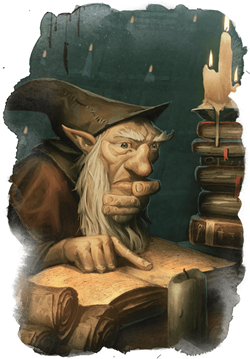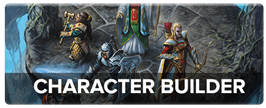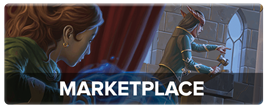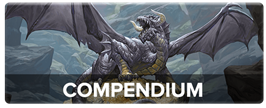 New Player’s Guide is going on hiatus, giving us some space to return to beloved series like Class 101, Spell Spotlight, How to Play Monsters, and to explore new ideas. In the meantime, however, we want to know what D&D questions are burning in your mind, so that we can answer them once we come back. Reply to the comments of this post with ONE question for D&D Beyond’s Lead Writer James Haeck.
New Player’s Guide is going on hiatus, giving us some space to return to beloved series like Class 101, Spell Spotlight, How to Play Monsters, and to explore new ideas. In the meantime, however, we want to know what D&D questions are burning in your mind, so that we can answer them once we come back. Reply to the comments of this post with ONE question for D&D Beyond’s Lead Writer James Haeck.
We’re looking for questions about Dungeon Master skills, player tips, dungeon design, encounter design, magic item design, monster design, and anything else that will help you be the best DM or player you can be!
When New Player’s Guide returns from hiatus, we’ll have combed through your questions with a particular eye for ones that will benefit the entire D&D Beyond community. We can’t wait to read your questions!
Create A Brand-New Adventurer Acquire New Powers and Adventures Browse All Your D&D Content
 James Haeck is the lead writer for D&D Beyond, the co-author of Waterdeep: Dragon Heist, Baldur's Gate: Descent into Avernus, and the Critical Role Explorer's Guide to Wildemount, a member of the Guild Adepts, and a freelance writer for Wizards of the Coast, the D&D Adventurers League, and other RPG companies. He lives in Seattle, Washington with his fiancée Hannah and their animal companions Mei and Marzipan. You can find him wasting time on Twitter at @jamesjhaeck.
James Haeck is the lead writer for D&D Beyond, the co-author of Waterdeep: Dragon Heist, Baldur's Gate: Descent into Avernus, and the Critical Role Explorer's Guide to Wildemount, a member of the Guild Adepts, and a freelance writer for Wizards of the Coast, the D&D Adventurers League, and other RPG companies. He lives in Seattle, Washington with his fiancée Hannah and their animal companions Mei and Marzipan. You can find him wasting time on Twitter at @jamesjhaeck.











-
View User Profile
-
Send Message
Posted Jul 24, 2020Please do a thing about dnd religions
-
View User Profile
-
Send Message
Posted Jul 24, 2020https://5emagic.shop/
-
View User Profile
-
Send Message
Posted Jul 24, 2020Is class/race synergy really needed?
-
View User Profile
-
Send Message
Posted Jul 24, 2020It is most certainly not. A lizardfolk would probably never be a bard, but who says they can’t be bards? Class/race limitations, logical or not, really limit your roleplay opportunities, and if you constrain yourself to certain race/class combinations, you’re probably not playing to your full potential
-
View User Profile
-
Send Message
Posted Jul 24, 2020Whenever I'm teaching new DM's I insist on 3 things. Have a list of NPC, village, and tavern names, do not ask for meaningless checks or checks you want them to succeed on, keep notes, even if it's just to make the players nervous. I'd like to know your top 3-7 list of good DM traits, as well as good player traits.
-
View User Profile
-
Send Message
Posted Jul 24, 2020Not a new player myself, but there is a topic that new players need help with all the time, Making an attack.
It should include:
How to roll (dis)advantage, how to quickly figure out what die you are using, and how critical hits or natural ones work.
How to add your modifiers, and how to work out the math before hand, because you are going to be using attack often.
What the difference is between; spell attacks, weapon attacks, melee attacks, ranged attacks, manufactured weapons, natural weapons, and unarmed strikes (and preferably a list of examples that work with each kind of attack)
How Cover and Prone work on attack rolls.
How Light Levels, Obscured, and attacking blindly work.
-
View User Profile
-
Send Message
Posted Jul 24, 2020My very wide question: How do you use higher level spells as a player? As a DM?
I'm thinking of Wish, Gate, Astral Projection, Creation, Etherealness. What adventuring opportunities do these types of spells allow?
-
View User Profile
-
Send Message
Posted Jul 24, 2020Designing Traps (dungeon obstacles) that do something more than deal damage that are fun and challenging. Encounters that aren't overly simplistic or frustrating for players. Something that is open ended and not a riddle that only has one answer.
- Many Thanks.
-
View User Profile
-
Send Message
Posted Jul 24, 2020Would Prestige classes be making a comeback in future books?
I really love 5E, but even starting at later levels doesn't alleviate the feeling of every fighter is the same as the next but with a different fighting technique, or how every wizard is basically the same except for a few different situational abilities.
-
View User Profile
-
Send Message
Posted Jul 25, 2020How does preparing spells work and what is its relation to known spells? I am DMing a Druid and and super confused on how it works
-
View User Profile
-
Send Message
Posted Jul 25, 2020preparing spells is choosing which spells you are committing to use for a single day, from the spells available to you according to your spell list. think of clerics, paladins, and wizards when they have constructed a spell list that exceeds their possible preparation limit for the day.
this video is a good reference: https://www.youtube.com/watch?v=i9ZnlZ7VudM
-
View User Profile
-
Send Message
Posted Jul 25, 2020I'm interested in how to give tool proficiencies a bigger role in games. A lot of backgrounds and subclasses give characters a tool proficiency or two, but unless a game has a good amount of downtime, I rarely see them getting utilized.
-
View User Profile
-
Send Message
Posted Jul 25, 2020i would like a guide on how to handle players that dont roleplay at all. maybe ways to help them roleplay more or just to include them in the roleplay sessions.
-
View User Profile
-
Send Message
Posted Jul 25, 2020Hi, James! Glad to see some old article types coming back for Round Two!
I have several suggestions for the next few articles.
Something on magic items for each class, and/or how to make a magic item for a certain character (I'm currently DMing a party with not one, but two rangers, and sometimes it's hard for me to come up with magic items for them) would be cool
Some other suggestions:
Worldbuilding through races
How much sandbox is the right amount of sandbox?
How to make and/or politicize varieties of factions for a world
How to make the perfect BBEG
How to make sure the players are equally engaged and each gets the same amount of attention
How to deal with muderhobos and/or players that don't roleplay well
How to stop the bad habits of new players and nudge them into roleplaying and making their own decisions
How to get cool things across to the players if you're bad at the roleplay/description required for an NPC, location that's supposed to be majestic, odd monster, etc.
And I think I speak for all of us when I suggest...
How to do hilarious voices without screwing them up
-
View User Profile
-
Send Message
Posted Jul 25, 2020I've been playing dnd for about three years, now. And I'm still having trouble with the first session of a campaign. I'm just about to start one, but I have no idea how to start it. Can you do one on first campaign sessions?
-
View User Profile
-
Send Message
Posted Jul 25, 2020What are some of the best examples you've seen of House Rules being successfully implemented?
-
View User Profile
-
Send Message
Posted Jul 25, 2020How to do dnd cheap?
-
View User Profile
-
Send Message
Posted Jul 25, 2020How to use the homebrew making. It's too hard, I gave up trying to make a homebrew background, and I couldn't even start subclass homebrew.
-
View User Profile
-
Send Message
Posted Jul 25, 2020I recommend checking out this article, and the other articles linked in it! Happy homebrewing!
https://www.dndbeyond.com/posts/845-new-players-guide-how-to-homebrew-on-d-d-beyond
-
View User Profile
-
Send Message
Posted Jul 25, 2020How many hit dice should I give a monster I create myself?